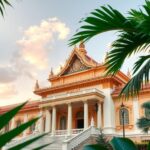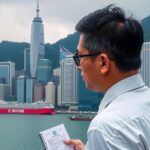Politics
ASIA, BEIJING, CENSORSHIP, CHINA, DICK WONG, DONG JINGWEI, HONG KONG, HUMAN RIGHTS, HUMAN_RIGHTS, MARGARET CHIU, MEXICO, MICHAEL MARTINA, MINISTRY, NORTH AMERICA, PAUL LAM, PRESS FREEDOM, REUTERS, S OFFICE FOR SAFEGUARDING NATIONAL SECURITY, STATE DEPARTMENT, THOMSON REUTERS, U. S, UNITED STATES, US
Omar El-Sharif
U.S. Sanctions Target Chinese and Hong Kong Officials Over Rights Abuses
The United States has sanctioned six Chinese and Hong Kong officials for their involvement in transnational repression undermining Hong Kong’s autonomy. This action is a response to the crackdown on democracy advocates and reflects bipartisan pressure within the U.S. government. The sanctions block any U.S. financial assets held by these individuals and aim to uphold democratic principles in Hong Kong.
On Monday, the United States imposed sanctions on six senior officials from China and Hong Kong due to allegations of transnational repression and diminishing the autonomy of Hong Kong. This action marks a significant step by the new Trump administration to confront China’s crackdown on pro-democracy figures in Hong Kong.
The U.S. State Department stated that the sanctioned individuals participated in actions that have threatened Hong Kong’s autonomy, directly contradicting China’s previous commitments. This includes their involvement in the intimidation and harassment of pro-democracy activists, many of whom have fled the region, including U.S. citizens.
Western nations have criticized China for enforcing a national security law that has been used to imprison pro-democracy activists and close liberal media outlets. Conversely, Chinese authorities argue that the law has established stability in Hong Kong following extensive anti-government protests in 2019.
The sanctions specifically target individuals such as Dong Jingwei, the director of Beijing’s Office for Safeguarding National Security in Hong Kong and a former intelligence official. The measures freeze any U.S. financial assets owned by Dong and five other Hong Kong police and security officials—including Sonny Au, Dick Wong, Margaret Chiu, Raymond Siu, and Paul Lam—who played roles in coercing or imprisoning individuals in alignment with the National Security Law.
U.S. lawmakers from both the Democratic and Republican parties had pressed the Biden administration to take action against these officials, culminating in the sanctions announced on Monday.
In summary, the U.S. sanctions on six Chinese and Hong Kong officials reflect a serious reaction to actions perceived as violations of human rights and autonomy in Hong Kong. The sanctions aim to hold accountable those implicated in the repression of pro-democracy activists, reinforcing the U.S. stance on the importance of democratic freedoms in the region. Both domestic political pressures and international criticisms of China’s policies contributed to this decisive step by the U.S. government.
Original Source: www.usnews.com








Post Comment